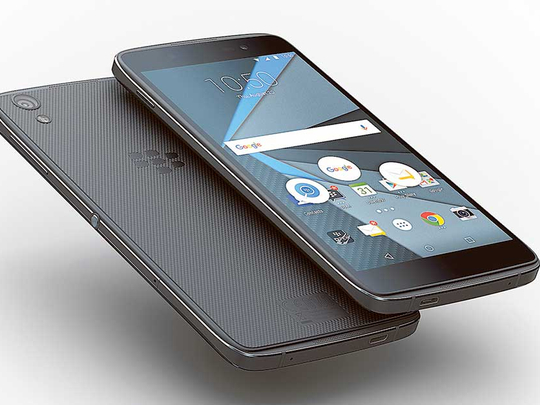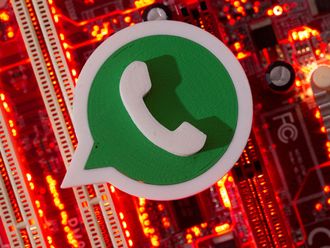
Dubai: BlackBerry’s second Android smartphone — DTEK50 — is a not a device made by the Canadian firm but it is the cloned Alcatel Idol 4 from TCL.
It is a standard Android phone with a few tricks and tweaks by Blackberry.
Alcatel Idol 4’s back is shiny but BlackBerry had made it rough and feels good to hold despite being all plastic.
But that does not mean the device is bad. It is 7.4mm thin and weighs 135 grams.
The 5.2-inch IPS device with 424 pixels per density is powered by Qualcomm’s octa-core 64-bit 1.5GHz processor with 3GB of RAM and 16GB of internal storage capacity. Storage can be extended up to 256GB via microSD card slot. It runs on latest Android 6.0.1 Marshmallow OS.
The display is protected with Dragontrail glass, in addition to an oleophobic coating that BlackBerry claims will make it harder for thieves to identify your PIN from fingerprint marks.
The mid-range device is not as snappy as other high-end smartphones and does not have an AMOLED display but it is a pretty decent device with a pair of good stereo speakers with Blackberry’s security layer.
The phone does come with a double tap to wake and sleep feature but it is slow at times to wake up.
There is a dedicated convenience key on the centre of the right side to launch an app the user want. Even though it cannot be used when the phone is locked, it is a pretty dedicated programmable button.
The DTEK50 lacks a dedicated camera button and the dedicated button can be applied to that.
BlackBerry Hub lets users see their email, SMS, calendar, phone calls and social media at a glance.
The BlackBerry productivity Tab, which sits on the right side of the screen, can be accessed from any screen and has a calendar, task list, BlackBerry Hub and contacts list. It is handy but it takes time to get used to it. BlackBerry’s home screen lets users swipe up on any icon to show a relevant widget, and users can also swipe up from the home button to get to one of three customisable shortcuts — device search, Google and BBM.
If you don’t like any of the BlackBerry’s features, you can install Google Now Launcher and it will turn into more Googlely and a plain Android phone.
The company is proudly advertising the device as “the world’s most secure Android smartphone.” It sounds good but every device running Android 6.0 or above is fully encrypted.
The DTEK app monitors and reports on application access to apps, enabling users to be confident that their personal data is being kept private. Security is supported at the kernel, firmware, OS and the apps level.
At the same time, Android 6.0 also forces apps to ask for those same exact permissions and with Android Nougat, the next version of the operating system, the device is protected from the boot-up process. It’s a little odd that the DTEK50 doesn’t have a fingerprint scanner.
It is difficult to say whether it is the most secured phone but BlackBerry has taken security as a priority. BlackBerry still rules the roost when it comes to enterprise-ready security.
DTEK 50 will face stiff competition from other mid-range devices running on latest Android OS.
The touch-enabled four-row keyboard offers contextual auto-correction, next-word prediction and a personalised learning engine that gets to know the way you type.
The 13MP rear camera with f/2.0, phase detection autofocus and dual-LED (dual tone) flash won’t win awards but it is a decent snapper. BlackBerry hasn’t had the best track record with imaging performance and lacks optical image stabilisation.
Don’t expect much from lowlight conditions and the photos are noisy and smudgy. It is also much slower to focus or shoot HDR images than today’s high-end phones.
It takes close up images pretty good but tends to struggle with wide-angle shots. To get a great looking photo, the lighting conditions have to be perfect, but even then, there is a noticeable lack of sharpness and detail when zooming in.
However, the good camera app has a manual mode for serious photographers which allows for finer control over focus, white balance, shutter speed, exposure compensation and ISO.
It’s certainly not a flagship device, but launching apps, multitasking and generally just getting things done generally aren’t a problem. Playing graphically-intense games like Asphalt 8 noticed a slowdown.
The 8MP front-facing camera is good for video conferencing and not a strong selfie device.
Video-recording tops out at 1080p. You can bump it up to 1080p at 60, 24 or 30 frames per second (fps) and 720p at 60, 30 or 24fps.
Regarding connectivity, it has WiFi 802.11 a/b/g/n/ac, Bluetooth 4.2, 4G, NFC and WiFi Direct. The device comes preloaded with lot of Blackberry apps apart from the Google apps.
The 2,610mAh battery lasted for almost nine hours in my standard video streaming and does not last for one day. It gave 13 hours of mixed use for heavy users, which is pretty mediocre. But it lasted for almost a day with low usage without WiFi and 4G.
It’s charged over via microUSB, and a fast charger is supplied in the box. The device takes around two hours to charge to full capacity. It is priced at Dh1,199.
Pros
• Some interesting software extras
• Solid build quality
• MicroSD slot
• Great virtual keyboard
• Superior audio quality and microphone
Cons
• Mediocre battery life
• Cloned Alcatel design
• Occasional hiccups
• Camera struggles in low light
•No fingerprint scanner











